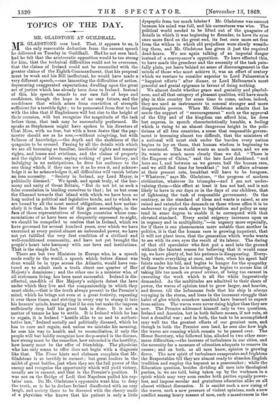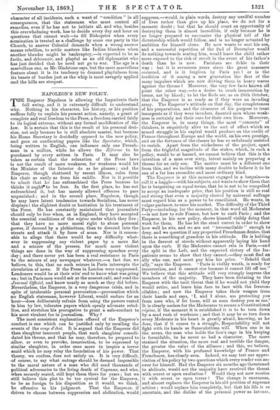TOPICS OF THE DAY.
MR. GLADSTONE AT GITILDRALT,
MR. GLADSTONE sees land. That, it appears to us, is the only reasonable deduction from the earnest speech he delivered on Tuesday in Guildhall. Had he not seen land, had he felt that the aristocratic opposition would be too strong for him, that the technical difficulties could not be overcome, that the claims of Ireland could not be reconciled with the greater claims of the Eighth Commandment, that his proposal must be weak and his Bill ineffectual, he would have made a very different speech,—one lamenting the difficulties of action, deprecating exaggerated expectations, dwelling upon the great act of justice which has already been done to Ireland. Instead of this, his speech sounds to our ears full of hope and confidence, though the hope is of no easy future, and the confidence that which arises from conviction of strength sufficient for a terrible fight ; to be permeated from first to last with the idea that if Englishmen will but rise to the height of their occasion, will but recognize the magnitude of the task before them, that task may be successfully performed. He speaks as Stephenson might have spoken to his directors of Chat Moss, with no fear, but with a keen desire that the pay- master should see as he sees,—without misgiving, but with fullness of knowledge,—the depth and the shakiness of the quagmire to be crossed. Passing by all the details with which we are all becoming so familiar, landlords' rights and tenants' rights, and leases and evictions, and the claims of property and the rights of labour, saying nothing of past history, and indulging in no anticipations, he fixes his audience to the one thing which, if they can see it as he sees it, and acknow- ledge it as he acknowledges it, all difficulties will vanish before an iron necessity. "Society in Ireland, my Lord Mayor, is politically diseased." We speak, and speak truly, of the har- mony and unity of Great Britain, "But do not let us seek a false consolation in binding ourselves to that ; let us but cross the Channel towards that island with which we have been so long united in political and legislative bonds, and to which we are bound by all the most sacred obligations, and how melan- choly it is that, in the face of this great assemblage, in the face of those representatives of foreign countries whose com- mendations of us have been so eloquently expressed to-night, we should be compelled to confess that in Ireland, which we have governed for several hundred years, over which we have exercised at every period almost an unbounded power, we have not yet fulfilled the very first condition of a civilized and well-conditioned community, and have not yet brought the people's heart into harmony with our laws and institutions. That is the simple fact."
There are but two Ministers in Europe who, in a speech made really to the world, a speech which before dinner was done would be in type across the Atlantic, would have ven- tured so to admit such a truth about one quarter of Her Majesty's dominions ; and the other one is a minister who, of all statesmen living, has been most successful. Ireland is dis- affected, one-fifth of Her Majesty's subjects detest the laws under which they live and the companionship in which they must abide,—that is the truth always present to the Premier's mind, which he brings out even at a great festivity, repeating it over three times, and striving in every way to stamp it into his hearers' minds, knowing that if he can but make the impress sufficiently deep half his great task is done. It is not a matter of tenure he has to settle. It is Ireland which he has to regain, it is Ireland "hostile alike to us and to authori- tative law," Ireland socially and politically diseased, which he has to cure and regain, and, unless we mistake his meaning, he sees his way to health and to reconciliation, if only the people will but boldly recognize how deep-seated is the disease, how strong must be the remedies, how extended is the hostility, how hearty must be the offer of friendship. The physician who has only senna to offer does not begin with a diagnosis like that. The Times hints and clubmen complain that Mr. Gladstone is so terribly in earnest ; but great leaders in the midst of great battles, just when they see the full power of the enemy and recognize the opportunity which will yield victory, usually are in earnest, and that is the Premier's position. It was not on the Bridge of Lodi that Napoleon pulled his cap- tains' ears. Do Mr. Gladstone's opponents want him to deny the truth, or is he to declare Ireland disaffected with an easy laugh, and society there to be diseased with the cheery smile of a physician who knows that his patient is only a little
dyspeptic from too much lobster? Mr. Gladstone was earnest because his mind was full, and his earnestness was wise. The political world needed to be lifted out of the quagmire of details in which it was beginning to flounder, to have its eyes. once more fixed on the great end, its feet once more set free from the withes in which old prejudices were slowly wreath- ing them, and Mr. Gladstone has given it just the required. dead-heave. We are again talking of an imperial danger instead of a conveyancer's opposition. To have effected this, to have made the grandeur and the necessity of the task pain- fully plain, yet leave behind no sense of discouragement in the minds of those who must achieve it, was an effort of oratory which we venture to consider superior to Lord Palmerston's. "happiest efforts" after dinner, or Lord Melbourne's most graceful and genial epigrams in favour of doing nothing.
We almost doubt whether grace and geniality and playful- ness, and all that category of pleasant qualities, will have much play in this country for some time to come, unless, indeed, they are used as instruments to conceal stronger and more disagreeable powers. When Mr. Gladstone admits that he needs the support of " encouragement " such as the approval of the City and of the kingdom can afford him, he does but express, in speech characteristically humble, a feeling which is rising to an almost dangerous height in the poli- ticians of all free countries, a sense that responsible govern- ment is becoming almost too difficult, that the ministers of a national will must sink under the burden every nation, begins to lay on them, that human wisdom is beginning to. be overtaxed. The world wants so much more, and we see' its wants so much more clearly than we did. "There is. the Emperor of China," said the late Lord Auckland, "and. here am I, and between us we govern half the human race,. and we still find time for breakfast ;" but if affairs advance at their present rate, breakfast will have to be foregone.. "Whatever," says Mr. Gladstone, "the progress of modern civilization, whatever its triumphs—and I ,am not under- valuing them—this effect at least it has not had, and is not likely to have in our days or in the days of our children, that of lightening the task of responsible government. On the as the standard of ideas and wants is raised, so are raised and extended the demands on those whose office it is to. endeavour to give such shape to legislation and policy as may tend in some degree to enable it to correspond with that elevated standard. Every social exigency increases upon us in urgency and in multiplicity,"—in urgency more especially,. for if there is one phenomenon more notable than another in politics, it is that the human race is growing impatient, that it will not plant trees, that the generation which works wants. to see with its own eyes the result of its labour. The daring of that old speculator who first put a seed into the ground without the faintest reason for believing that it would come up, we have plenty of, but his patience is disappearing. Every- body wants everything at once, and then, when his agent half faints under his toil, and begins to hunger for the sympathy of those for whom he is labouring, he begins to accuse him of taking life too much au grand se'rieux, of being too earnest in executing the work which is all the while imperatively demanded. As the multitudes are admitted to their share of power, the waves of opinion tend to grow larger, and heavier, and fiercer, till the helmsman feels that his ship is always voyaging in the storm, and loses in the incessant struggle that habit of glee which somehow mankind have learned to expect from sailors. The waves were never rising higher than they are now. The Premier addressed himself only to two questions, Ireland and America, but in both failure means, if not ruin, at best a dreadful war ; and in both, the task to be accomplished may well tax the greatest efforts of our greatest men, and though in both the Premier sees land, he sees also how high the waves are running which remain to be passed over. The Home Secretary, who followed him, alluded to two other enor- mous difficulties,—the increase of turbulence in our cities, and the necessity for a measure of education adequate to remove its causes ; and on both, as all men know, opinion is growing fierce. The new spirit of turbulence exasperates and frightens the Respectables till they are almost ready to abandon English tradition and employ the bayonet as a peacemaker ; while the Education question, besides dividing all men into theological parties, is, we are told, being taken up by the workmen in a spirit which may very soon render both parties equally power- less, and impose secular and gratuitous education alike on all almost without discussion. It is amidst such a new rising of the waves, such a new pressure of violent opinions, such a new conflict among heavy masses of men, such a massiveness in the character of all incidents, such a want of " condition " in all consequences, that the statesman who must control all remedies, even if he has not to initiate all, and who, besides this overwhelming work, has to decide every day and hour on questions that cannot wait—to fill Bishoprics when every nomination is treated as a challenge by some one party in the Church, to answer Colonial demands when a wrong answer means rebellion, to settle matters like Indian blunders when another blunder might be bankruptcy,—is expected to be as acile, and debonnair, and playful as an old diplomatist who has just decided that he need not go to war. The age is a marvellous one, as Mr. Gladstone says, but the most marvellous feature about it is its tendency to demand playfulness from its beasts of burden just as the whip is most savagely applied and the hills are steepest.



































 Previous page
Previous page